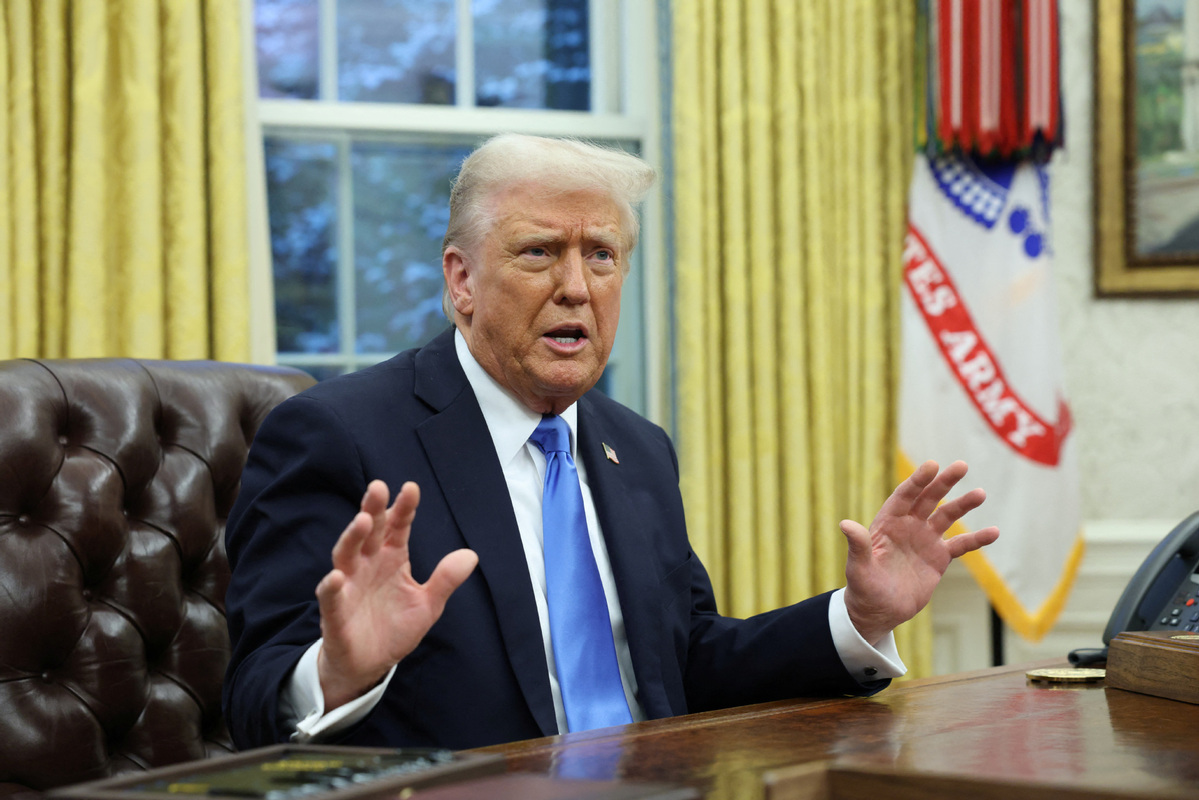
US President Donald Trump speaks in the Oval Office of the White House in Washington, DC, US, February 11, 2025. [Photo/Agencies]
An esteemed scholar has suggested that the administration of United States President Donald Trump should feature "win-win solutions" in its policies to avert a loss of goodwill in the rest of the world.
"I hope that somebody will try to inject the words 'win-win solutions' into the dialogue and discourse of the Trump administration people," said Kishore Mahbubani, Singapore's former ambassador to the United Nations, at a webinar on Wednesday.
In the first three weeks of Trump's second term as president, the White House has issued numerous executive orders, actions and pronouncements, including imposing tariffs on trade partners and considering territorial expansion.
"I think it's certainly in the first six months they'll go around doing this bashing, which, unfortunately, is going to lead to lots of loss of goodwill in many parts of the world," said Mahbubani, who served as the president of the UN Security Council in 2001 and 2002.
Mahbubani made the remarks during an online book conversation with the Quincy Institute for Responsible Statecraft, a think tank based in Washington, DC.
He suggested that the Trump administration should find one or two areas of the world in which it could develop a positive agenda and achieve positive results, and then demonstrate to the international community the potential for collaboration and win-win solutions.
Imposing sanctions and tariffs is "not the way you win friends", Mahbubani said.
Mahbubani, a distinguished fellow at National University of Singapore's Asia Research Institute, suggested using Southeast Asia as the place to establish a win-win model.
The author of nine books, including the latest, Living the Asian Century, Mahbubani said the West should learn from Asian countries how to find compromise solutions and ways for peaceful coexistence.
Although Western civilization dominated for the past 200 years, the 21st century will be characterized by multicivilizational, multipolar and multilateral dynamics, he said.
"One reason why American diplomacy has run into a ditch, and European diplomacy has run into a ditch, is because when they come across a society which is not like them, which is different from them, they immediately say, 'No, no, no, something is wrong with you. I've got to impose sanctions on you'," he said.
In Asia, people understand differences and the need to coexist, so they find solutions to live together, Mahbubani said. However, he added that Western diplomats have stopped using this basic practice because they impose sanctions whenever they have a problem.
"What would sanctions achieve? Nothing. Have sanctions ever changed any country? Never. So why don't you just continue talking to people?" he said.
Asian people always try to find compromise solutions, a practice that Mahbubani said the West should learn from.
Furthermore, Asia is doing the right things as a result of being very careful, pragmatic and doing the best to treat one another with the utmost respect and never give condescending lectures or insult leaders, according to Mahbubani.
One of the worst practices of Western media is "to constantly insult leaders", he said. "So this is a result of 200 years of cultural condescension from the 19th and 20th centuries flowing into the 21st century, where it's going to hit a big, hard wall."
In the book conversation, Mahbubani also said there are "some fundamental mistakes in the assumptions" by the US regarding China.
"All the effort, I mean, look at the entire four years of the (Joe) Biden administration — (it) is containment policy. You know, whatever it is, all the AUKUS (security partnership) and all these things were designed, were going to fail anyway. You cannot succeed in containing China," he said.
Mahbubani also mentioned The End of History, a 1989 essay by American political scientist Francis Fukuyama, who later published the book The End of History and the Last Man in 1992.
"The most damaging part of The End of History essay was that it actually made those in the United States and the West feel, 'Hey, we won, so from now on, the rest of the world has got to converge toward us and become like us'," Mahbubani said.
Fukuyama, in an online discussion about "America's Democracy in the Age of Trump" on Wednesday, said Trump's economic policies are "mutually contradictory".
"He can't do all the things that he's claiming that he wants to do. You know, you cannot impose 25 percent tariffs on Canada and Mexico and not see inflation come roaring back in a big way," he said.
Fukuyama also said that ongoing deportation efforts will contribute to labor shortages, which will drive up wages and also contribute to inflation.
US consumer inflation increased again last month as the cost of groceries, gasoline and rent rose. The consumer price index edged up to 3 percent in January — higher than expected — from a year ago, according to data released by the Labor Department on Wednesday.